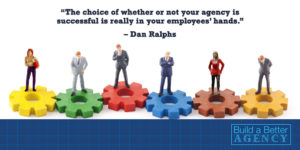My entreé into agency life was as a copywriter. I loved digging around and finding the story underneath the story. That love was the foundation for my belief in the power of a strong and smart brand. For decades my agency has helped clients define, develop, and deploy their brand both internally and externally. It’s still some of my favorite work to do.
Understanding your unique story is a powerful competitive advantage for our clients and our own agencies. Without understanding what makes us unique – we have to swim in the sea of sameness and that’s definitely swimming upstream!
In this episode, we’re digging into storytelling by understanding it at the root level. There is an architecture to stories and I have gone to the expert to learn more about that structure and how, as agencies, we can better use it to build our clients’ brands – and our own as well.
My guest is Park Howell. For 25 years, Park ran an agency in Arizona called Park & Co. At a certain point in his career, he pivoted his agency to become a storytelling consultant, helping clients learn how to tell their own story. Park founded his consultancy, The Business of Story, on January 1, 2016, so he could partner with leaders of purpose-driven organizations and help them clarify their stories, amplify their impact, and simplify their lives.

What You Will Learn in this Episode:
- How the hero’s journey has been with us since the beginning of storytelling
- Why story is one of the most powerful tools in your brand building arsenal
- How to help clients live into their most powerful stories
- Who should be the hero of the story (the answer might surprise you)
- Why it is so hard for agencies to discover and tell their own stories
- How storytelling connects with something so primal in all of us
- How to use storytelling to help customers fulfill what they wish, will, and want
Ways to Contact Park Howell:
- Website: https://businessofstory.com/
- What’s Your Story worksheet: https://businessofstory.com/storytelling-tools/#
- Storytelling Workbook: https://businessofstory.com/brand-storytelling-workbook/
The challenge with digital trends is that they are moving so swiftly, it’s hard to keep up. There are so many shiny objects flying around our heads, it’s dizzying. How do you know which ones are worth tracking and learning?
That’s where this week’s guest comes in. Tom Webster is the senior vice president at Edison Research. Edison is probably best known outside our world for being the sole provider of exit poll data during United States elections. But from our agency vantage point, most of us know Edison for their annual study, the Infinite Dial. The Infinite Dial remains the longest-running study of consumer behaviors around media and technology in America, and serves as the digital media trends bible for many since its inception in 1998.
The work that Tom and his team at Edison, along with partner Triton Research, have done for decades is highly anticipated every year and provides mission-critical information to agencies throughout the world. We’re going to dig into the data and find some surprises for you.
Tom Webster has nearly 20 years of experience researching consumer usage of technology, new media, and social networking. In addition to The Infinite Dial, he is the principal author of a number of widely-cited studies, including The Social Habit and Twitter Users in America. He is also the co-author of The Mobile Commerce Revolution, and a popular keynote speaker on data and consumer insights.

What You Will Learn in this Episode:
- How the social media landscape is shifting
- Why podcasting is becoming more popular
- What works – and what doesn’t – in podcast advertising
- The ins and outs of brand lift
- Why being a ‘capital S’ show is important in terms of podcast popularity
- A deep dive into the data from The Infinite Dial 2019
- Why starting with the audience is critical for all good content
- The work ahead of us in entering the voice assistant space
Speaking engagements can be a great way for agency owners to connect with their sweet spot prospects and be immediately perceived as a subject matter expert. Wanting to book speaking gigs and being successful at making that happen are two very different things. Even if you have some speaking engagements under your belt, getting chosen by a conference planner is another challenge to navigate.
Even seasoned pros must keep their eyes on the prize. I have always used speaking as one of my primary biz dev strategies (for both my agency and AMI) but I learned early on that it’s easy to get discouraged, distracted, or dismissed if you don’t have a smart strategy in place.
How do you build a speaking strategy that serves your agency business development objectives?
In episode #192, I talk with Steve Markman, who offers some hard-earned, straightforward advice on preparing a speaker proposal and getting it noticed by decision-makers. We also talk about how to determine whether a particular speaking opportunity is the right strategic move. We even tackle the age-old question of “should I speak for free?”
We’ll dig into all the nitty-gritty details of how to take full advantage of the right speaking platforms and when to stay home.
Steve Markman started Markman Speaker Management, LLC in 1994. It’s a speaker’s bureau with access to an international network of speakers in all fields and industries. He also coaches business owners and professionals on how to best speak for the right reasons to the right audiences.
Steve has over 30 years of experience in the conference, event, and speaker business, working with groups like the Conference Board and Society of Professional Consultants. Having been a conference producer working with some of the world’s largest events, Steve understands the importance of quality speaking engagements from both the speaker and conference planner perspectives.

What You Will Learn in this Episode:
- The key components of a speaker proposal
- How to respond to a call for speakers
- How to ensure the audience is your target market
- How to establish a connection with the conference organizer
- The difference between formal and informal speaker submissions
- Best practices for organizing your conference presentation
- How to measure the value of presenting, even if need to pay your own expenses
- How many speaking engagements is too many
Ways to Contact Steve Markman:
- LinkedIn: https://www.linkedin.com/in/stevemarkman/
- Email: smarkman@markmanspeaker.com
- Get More Speaking Engagements: https://www.markmanspeaker.com/staff-training.html
- Website: https://www.markmanspeaker.com/
Whether we articulate them or not – we all have dreams. One of mine for me (and for all of you!) is to visit every Disney theme park in the world. Not that I want to mandate your dreams but who doesn’t love Disney?
The truth is, a serious business case can be made for agency owners to help their team members achieve their dreams. I know this from first-hand experience. More than a decade ago, I read the book Dream Manager by Matthew Kelly and began to implement it in my own agency. I believe it’s one of the reasons I have the employee tenure (17+ years on average) that I do. So when I met Dan Ralphs and learned about his company/mission, I knew I had to get him on the podcast.
Dan is the founder of Dream Leadership Consulting and is one of the world’s foremost experts in unlocking the power of dreaming inside a workplace. We often think that someone’s personal goals and dreams should be separate from their work life but that’s so short-sighted when you think about it. Your goal is to create an environment where your rock stars can flourish, be happy, and stick around for a long time. Why not help them achieve their dreams?
Before founding Dream Coach, Dan was the facilitator of the Dreaming Program at Infusionsoft, where he helped its employees identify, articulate, and accomplish their dreams – all based on the work by Matthew Kelly’s book.
Dan has the amazing ability to help people discover their dreams and learn how to go after them. His realistic approach toward dreaming recognizes that dreaming is not a ‘magic pill’ but, rather, a new way of thinking about our ability to create.
He is also the creator of the Dream Leader Certification course, through which he has helped more than 100 leaders from across the world become Dream Leaders to those whom they lead.
Together, they have helped their people accomplish dreams like buying a first home, riding elephants in Thailand, and starting a foundation to help mothers facing infant loss. Due to the efforts of Dan and the Dream Leaders he has certified, thousands have been awakened to their dreams and their ability to achieve them.
What You Will Learn in this Episode:
- The power of helping employees achieve their dreams
- Why investing in employees leads them to invest in the agency
- How to advocate for people’s dreams without simply writing a check
- Why helping employees achieve dreams must be more than a means to an agency end
- How to establish systems around dream fulfillment
- How to help people understand the price tag attached to their dreams
- Why agency owners experience greater fulfillment in their work when they encourage others to fulfill their dreams
